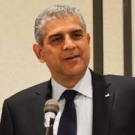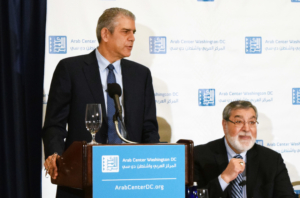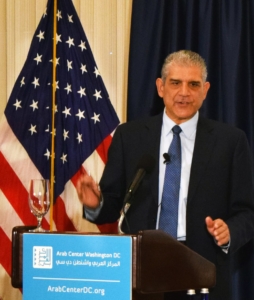Speaker

Ambassador Maen Areikat
Chief Representative of the PLO General Delegation to the United States
Moderator
Event Summary
Arab Center Washington DC (ACW) held its first ambassadorial luncheon of 2017 on January 10 with Ambassador Maen Areikat, Chief Representative of the PLO General Delegation to the United States. The event, titled “Prospects for Palestinian Statehood: UN Resolution 2334 and John Kerry’s Speech,” was moderated by ACW’s Executive Director, Khalil Jahshan.
Areikat began by describing the “overreaction” of Israel and US members of Congress to the US abstention during the United Nations vote on Resolution 2334, which reaffirmed that Israeli settlements in the occupied Palestinian territories have no legal validity and violate international law. It is notable, he said, that Washington did not vote for this resolution; it just abstained. Nevertheless, the fact that the resolution passed brings two important matters to the fore: 1) it distinguishes between the occupied Palestinian territories and the state of Israel and acknowledges that settlements are illegal, which will buttress Palestinian and international efforts to boycott Israeli settlement products; and, 2) it sends a clear message to the world that all Israeli measures and actions in the occupied territories, including East Jerusalem, are now null and void.
One crucial point, Areikat said, is that the resolution contains no mechanism for implementing the principles that it lays out. The upcoming summit in Paris needs to address this issue and to formulate a timetable as well. Such actions will show the extent of the seriousness of the international community.

In 2011, Areikat noted, Obama missed a big opportunity to support a proposed UN resolution that condemned Israeli settlements. After the US veto of this resolution in the Security Council, Obama’s administration effectively abandoned efforts to press Israel to stop settlement construction. “Things would be different today” had the president backed that resolution. Indeed, during Obama’s tenure, 100,000 settlers were added to illegal settlements in the Israeli-occupied Palestinian territories, bringing the total today to 400,000 in the West Bank and 250,000 in East Jerusalem.
As for Kerry’s recent speech regarding settlements and the two-state solution, Areikat said that although the PLO does not necessarily agree with everything Kerry said, his pronouncements represented an important step taken by the US Secretary of State. “I think he was genuine and sincere,” Areikat remarked. He noted the timing of the speech—just a few weeks before the incoming Trump Administration—and the fact that Kerry courageously mentioned the word “Nakba” and said that the occupation was against American values. Some analysts, Areikat explained, characterized Kerry’s words as “too little, too late”; indeed, the PLO would have welcomed such a speech two or three years ago so that the Obama administration could have had time to follow up with additional actions. If the United States does not take initiative in the future, there are many other states in the world that are very unhappy with Israel’s treatment of the Palestinians and they will not stand idly by. He asked, will this end the United States’ role as a peace broker between Israelis and Palestinians?

Regarding President-elect Trump, Areikat said the PLO will wait until his administration is in place and then formulate a strategy. He was forthright in saying that the PLO would not abandon its principles regarding international law and issues such as the status of Jerusalem, borders, and settlements. If the idea to move the US embassy to Jerusalem gains traction, this would be against longstanding US policy and will make the United States itself a violator of international law. To that end, the PLO is consulting with Jordan—the custodian of the holy places in Jerusalem—and others and plans to use all legal, diplomatic, and nonviolent means to resist such a move.
The Palestinian reality also affects other countries in the region, so “it would be wise for the new administration to deal with these sensitive issues with caution and wisdom,” Areikat advised. The PLO will engage the Trump Administration and hopes this will happen soon, he said, and will ask the new policy makers to listen to the viewpoints of Palestinians and others in the region who have a stake in the resolution of the conflict. He added that measures such as cutting aid to the Palestinians or bypassing or ignoring them in future negotiations and agreements will most certainly not bring peace to the region.
*Ambassador Maen Rashid Areikat is the Chief Representative of PLO General Delegation to the United States. Prior to his appointment to Washington, he was bestowed the rank of Ambassador by Chairman of the PLO and Palestinian National Authority President Mahmoud Abbas. Ambassador Areikat served for 11 years at the Negotiations Affairs Department (NAD) of the PLO in Ramallah, most recently as its Deputy Head and Coordinator-General (2008- 2009).

